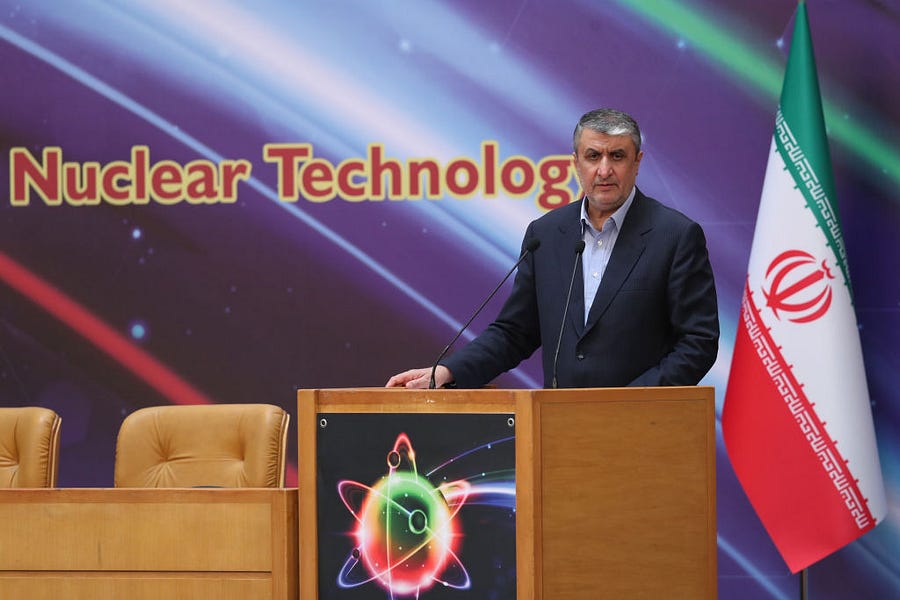The Biden administration scored a diplomatic victory in June when Washington and its European allies spearheaded the international censure of Iran for failing to cooperate with an investigation into Tehran’s past nuclear activities. That positive momentum was short-lived. Last month, Mohammad Eslami, the head of Iran’s Atomic Energy Organization (AEOI), rejected cooperation with the International Atomic Energy Agency (IAEA), declaring that the 2015 nuclear deal with Iran absolves his country of probes into past nuclear work. He said those issues are “closed” and “will not be reopened.”
Tehran’s response is not surprising after years of non-cooperation with the IAEA inquiry. The clerical regime has drawn out talks aimed at restoring the 2015 deal, formally known as the Joint Comprehensive Plan of Action (JCPOA), to approach the threshold of an atomic weapons capability. At a new round of negotiations in Vienna last week, Iran doubled down on its demand that the IAEA close its probe before Tehran agrees to revive the accord. Washington and Europe should not take the bait. They should end the talks and call a special IAEA meeting to give Iran a firm deadline to meet its nonproliferation obligations. If Tehran does not comply, they must snap back the international sanctions against the regime.
As a party to the Nuclear Non-Proliferation Treaty (NPT), Iran is legally required to declare all sites where it makes nuclear material and to cooperate with IAEA inquiries aimed at ensuring the peacefulness of its atomic program. This obligation is entirely separate from commitments made under the JCPOA. Yet the Islamic Republic has failed to answer the IAEA’s questions about the presence of man-made uranium particles the agency found in 2019 and 2020 at three Iranian sites, and has not answered inspectors’ questions about a fourth site. In June, the IAEA’s 35-nation Board of Governors finally passed its first censure of Iran in two years, calling on Tehran to act “without delay” and “resolve all outstanding safeguards issues.”
That was a step forward, but President Joe Biden created most of the roadblocks to holding Iran accountable. Despite the Biden administration’s efforts to blame Iran policy failures on President Trump’s 2018 JCPOA withdrawal, Tehran’s most egregious nuclear advances happened during Biden’s presidency. The president entered office promising to lift Iran sanctions in exchange for a return to the deal. He then gave Tehran breathing room from U.S. sanctions, which ultra-hardliners used to solidify ties to China and Russia and fortify their resistance economy.
The clerical regime clearly wants Biden to end the IAEA’s probe just as the Obama administration stopped a similar investigation to ensure the implementation of the 2015 nuclear deal. Under the terms of the nuclear accord, world powers instructed the IAEA to issue a “final report” assessing the possible military dimensions of Iran’s nuclear program. Iran stonewalled the investigators, but the IAEA Board of Governors voted in December 2015 to suspend the inquiry lest it prevent implementation of the JCPOA. AEOI chief Eslami was referring to this decision when he claimed the JCPOA had immunized Iran from probes of past nuclear activities.
The folly of ignoring past violations became clear in 2018, when Israel stole a tranche of Iran’s nuclear weapons files, proving beyond doubt that Tehran had a nuclear weapons program up until 2003, despite the regime’s denials. The documents showed that senior Iranian officials plotted to downsize and better hide their nuclear efforts after the work was exposed. The IAEA assessed the files to be authentic and has investigated information about undeclared sites, nuclear material, and activities ever since—but with very limited cooperation from Tehran.
The showdown at nuclear talks over the IAEA’s investigation is occurring in the shadow of Iran’s unprecedented nuclear advances and the Islamic Republic’s efforts to severely limit IAEA monitoring of its atomic program.
Iran is steadily moving closer to the nuclear threshold, the point at which Tehran’s close proximity to atomic weapons may render ineffective foreign action to stop a breakout. In April 2021, the month nuclear talks began, the regime enriched uranium to 60 percent purity—close to 90 percent or weapons-grade. Overall, it now has enough enriched uranium for five nuclear bombs. The regime has also installed and operated hundreds of advanced centrifuge machines for uranium enrichment, and has manufactured uranium metal, a material used in the core of nuclear weapons. It could make weapons-grade uranium within weeks, and its timeline to exploding a working nuclear device may be under six months.
Amid these rapid advances, Tehran has dramatically curtailed IAEA monitoring, prompting its director general, Rafael Grossi, to lament the agency’s limited oversight in Iran with all manner of illustrative analogies: the IAEA is “flying in heavy clouds” or “on a ventilator”; the JCPOA has been dealt a “fatal blow”; and Iran’s nuclear program is “galloping ahead.” In short, the effectiveness of international monitoring is open to doubt.
In February 2021, Iran ended IAEA access to sites related to production of centrifuges, mining and milling of uranium, and an array of other sensitive activities. It pledged to retain video monitoring and data recording of events at nuclear sites, but only to turn over footage and information once it received sanctions relief. After the IAEA’s resolution in June, Iran retaliated by switching off dozens of IAEA cameras and data collection devices at atomic sites and put in question whether it would ever turn over safeguards information. The AEOI’s Eslami ratcheted tensions further, stating that Iran will not turn on the watchdog’s cameras “until the other side [the West] returns to the nuclear deal.”
Despite the seriousness of these developments, the Biden administration seemingly does not have a plan. It seems content to allow the European Union, the mediator between the United States and Iran, to push for a renewed nuclear deal without any regard for Tehran’s continued escalations and demands that the IAEA close its inquiry. All the waiting, however, only increases the danger posed by the Islamic Republic’s nuclear program and presumably strengthens Tehran’s temptation to make a dash to weapons. Meanwhile, the JCPOA’s provisions are expiring and Iran’s technical advances have rendered defunct most of the deal’s value, even if it were restored.
It is time for Washington and Europe to staunch the bleeding and remind Iran that they still have leverage over Tehran’s momentum toward the bomb and its flouting of nonproliferation obligations.
The United States should begin by exiting the nuclear talks and calling a special IAEA board meeting to denounce Iran’s continued non-compliance with the IAEA’s investigation, Iran’s expanding nuclear program, and Iran’s reductions in IAEA monitoring. The June 2022 board resolution focused on Tehran’s obstruction of the investigation, but failed to even mention Iran’s nuclear advances or obstruction of monitoring activities. It is unclear why the resolution omitted these key issues, but the United States and its European partners have been reluctant to tackle these matters for fear of upsetting negotiations on a return to the JCPOA. The parties must rectify this mistake.
A new resolution must give Tehran a deadline to cooperate with the IAEA and should require the regime both to explain what it did at the sites in question and to restore agency monitoring. If Iran fails to meet the deadline for compliance set by the board, the board must refer Iran’s case to the U.N. Security Council.
To be sure, Russia and China will block the passage of any new Iran resolution, so board referral is mostly a procedural step to pave the way for other countermeasures: Namely, Washington and Europe should trigger the snapback mechanism contained in U.N. Security Council Resolution 2231—the JCPOA’s implementing resolution—which permits signatories to the nuclear deal to reinstate all prior U.N. sanctions. Notably, this would also restore the previous U.N. standard prohibiting any uranium enrichment in Iran. The United States and Europe should act on the basis that Iran is in violation of its NPT commitments and is not interested in nuclear restraint or transparency.
The Biden administration tried the diplomatic path, but Iran has not acted in good faith. State Department Spokesman Ned Price said last month that the administration will “pursue alternatives” to the 2015 nuclear deal when “it’s no longer in our interest to pursue a mutual return to compliance.” That time is now. Washington and Europe must act soon to prevent an Iranian atomic bomb.
Andrea Stricker is deputy director of the nonproliferation and biodefense program at the Foundation for Defense of Democracies. Anthony Ruggiero is senior director of the program and served as the National Security Council’s senior director for counterproliferation and biodefense in the Trump administration. Follow Andrea and Anthony on Twitter @StrickerNonpro and @NatSecAnthony. FDD is a Washington, D.C.-based, nonpartisan research institute focused on national security and foreign policy.





Please note that we at The Dispatch hold ourselves, our work, and our commenters to a higher standard than other places on the internet. We welcome comments that foster genuine debate or discussion—including comments critical of us or our work—but responses that include ad hominem attacks on fellow Dispatch members or are intended to stoke fear and anger may be moderated.
You are currently using a limited time guest pass and do not have access to commenting. Consider subscribing to join the conversation.
With your membership, you only have the ability to comment on The Morning Dispatch articles. Consider upgrading to join the conversation everywhere.